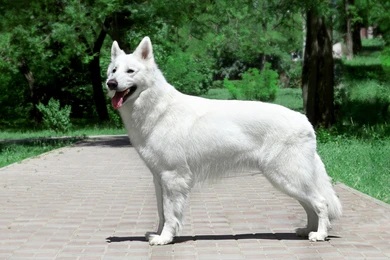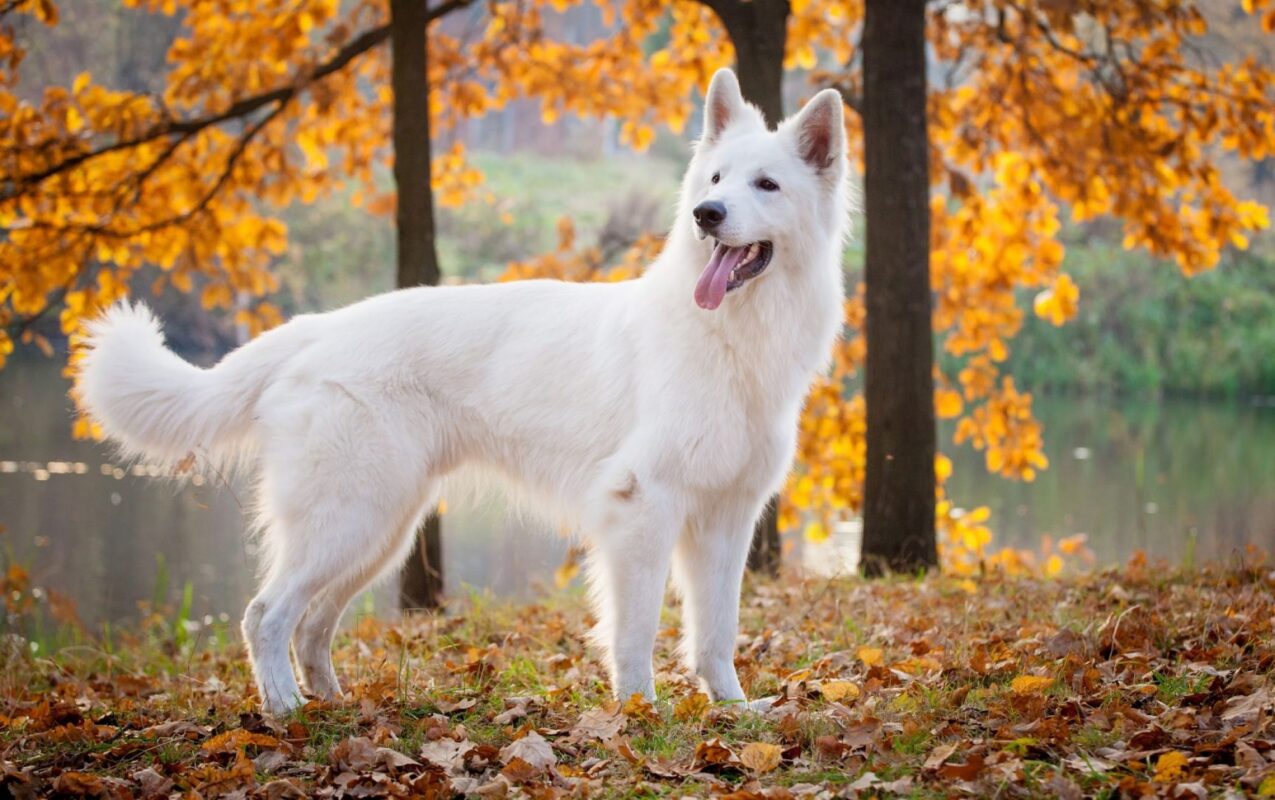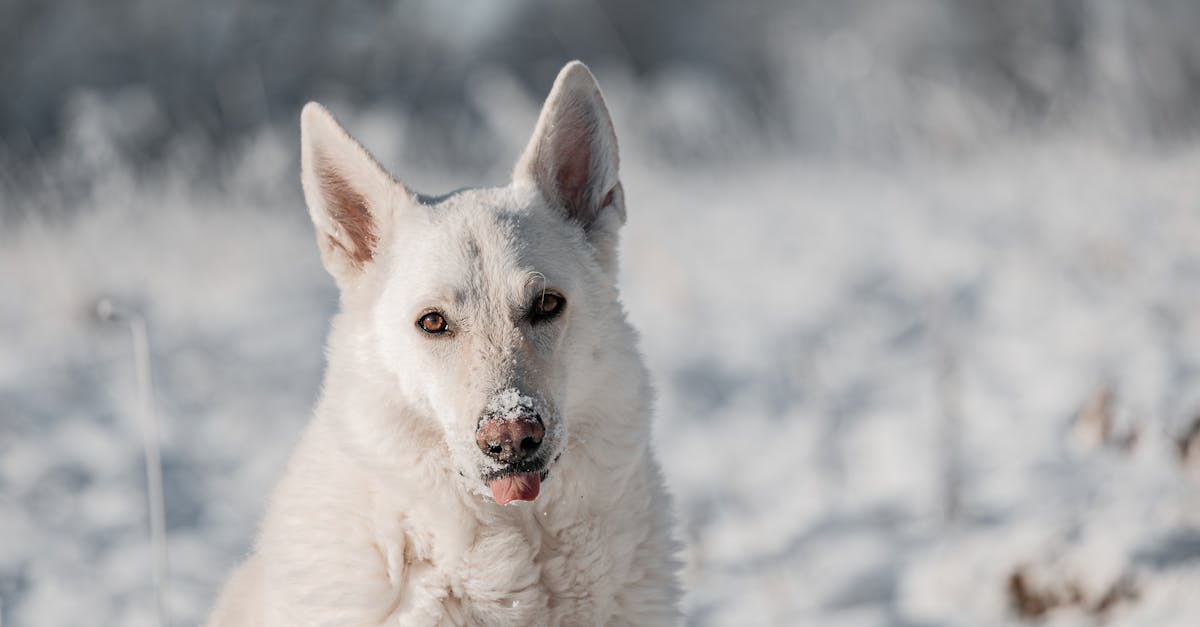Swiss Shepherd: The Gentle White Guardian | Complete Breed Guide 2025
Discover the Swiss Shepherd, a gentle, intelligent breed perfect for active families. Known for their white coats and loyalty, learn care tips and adoption insights.
Have you ever encountered a dog that’s as striking as it is gentle? Meet the Swiss Shepherd, a majestic breed that’s captivating dog lovers across the United States. With their pure white coats and friendly demeanor, these dogs are quickly becoming a favorite among families seeking a loyal and versatile companion.
Originally descended from the German Shepherd, the Swiss Shepherd has carved out its own identity. We’ll explore how this breed combines the intelligence and athleticism of its ancestors with a uniquely calm temperament. From their origins in Canada to their recognition by the Fédération Cynologique Internationale, we’ll uncover the fascinating journey of the Swiss Shepherd and why they’re an excellent choice for active households.
What Is a Swiss Shepherd?
The Swiss Shepherd, also known as the White Swiss Shepherd Dog or Berger Blanc Suisse, is a herding breed that originated from white-coated German Shepherd lines. These medium-sized dogs are characterized by their pure white coat and gentle temperament, making them excellent family companions.
Origins and History
The Swiss Shepherd’s history is intertwined with that of the German Shepherd Dog. In the early 20th century, white German Shepherds were considered undesirable and excluded from breed standards. But, these white-coated dogs gained popularity in Canada and the United States. Breeders in these countries began selectively breeding white German Shepherds, leading to the development of a distinct breed. The Swiss Shepherd’s lineage can be traced back to an American-born white German Shepherd named Lobo, whelped in 1966. This dog was imported to Switzerland in 1970, becoming the foundation for the breed in Europe.
Breed Recognition
The Swiss Shepherd’s journey to official recognition began in Switzerland. In 1991, the Swiss Cynological Society registered the first White Shepherd, and by 2003, the breed was provisionally recognized by the Fédération Cynologique Internationale (FCI). Full recognition by the FCI came in 2011, solidifying the Swiss Shepherd’s status as a distinct breed. The United Kennel Club (UKC) in the United States recognized the breed in 1999. But, the American Kennel Club (AKC) currently recognizes white German Shepherds as part of the German Shepherd breed standard, not as a separate breed. The Swiss Shepherd continues to gain popularity worldwide, appreciated for its unique appearance and gentle temperament.
Physical Characteristics
The White Swiss Shepherd boasts a powerful and well-muscled build with harmonious lines. This medium-to-large breed exhibits an elongated rectangular outline, reminiscent of its German Shepherd ancestry.
Size and Weight
White Swiss Shepherds are substantial dogs with distinct size differences between males and females. Males typically stand 58-66 cm (22-26 inches) tall at the withers and weigh 30-40 kg (66-88 pounds). Females are slightly smaller, measuring 53-61 cm (20-25 inches) in height and weighing 25-35 kg (55-77 pounds). These dimensions contribute to the breed’s impressive and athletic appearance, making them well-suited for various activities and roles.
Coat and Color
The White Swiss Shepherd’s most striking feature is its thick, dense double coat. This coat comes in two varieties: medium-length and long. Both coat types provide excellent protection against various weather conditions. The outer coat may have a slight waviness, adding to the breed’s distinctive appearance. As the name suggests, White Swiss Shepherds are entirely white, with no other color variations accepted in breed standards. This pure white coat gives them a majestic and elegant look, setting them apart from other shepherd breeds.
Distinctive Features
White Swiss Shepherds possess several distinctive features that contribute to their unique appearance and functionality. They have a strong, elongated neck that blends smoothly into well-defined withers. Their back is sturdy and long, with a muscular loin region. The chest is moderately narrow but deep, providing ample lung capacity for endurance. A lean, tucked-up abdomen further enhances their athletic silhouette. The breed’s sloping hindquarter stance, similar to German Shepherds, contributes to their efficient gait and agility. These features combine to create a dog that’s not only visually striking but also well-equipped for various physical activities and working roles.
Temperament and Personality
Swiss Shepherds are known for their lively, alert, and intelligent nature. These versatile dogs possess a unique blend of traits that make them excellent family companions and working dogs.
Loyalty and Devotion
Swiss Shepherds exhibit unwavering loyalty and devotion to their families. Their strong bond with owners manifests in a desire to be close at all times, often following family members around the house. This clinginess stems from their deep emotional connection and sensitivity. While their protective instincts may lead to barking at strangers, Swiss Shepherds typically calm down once they become familiar with new individuals. Their vigilant nature, combined with their friendly disposition, makes them ideal watchdogs without being overly aggressive.
Intelligence and Trainability
Swiss Shepherds are highly intelligent dogs, making them exceptionally trainable. Their keen minds and eagerness to please their owners contribute to their success in various roles, including therapy work, search and rescue, and obedience competitions. These dogs excel in problem-solving tasks and respond well to positive reinforcement training methods. Early socialization and consistent training are crucial to harness their intelligence effectively. Swiss Shepherds thrive on mental stimulation, so providing them with puzzle toys and captivating activities helps keep their minds sharp and prevents boredom-related behaviors.
Social Nature
Swiss Shepherds are generally friendly and sociable dogs, but their sensitive nature requires proper socialization from an early age. When well-socialized, they interact positively with children, other pets, and strangers. But, their emotional sensitivity can lead to anxiety issues if not properly managed. Swiss Shepherds may develop separation anxiety, stranger anxiety, or general anxiety if left alone for extended periods or exposed to unfamiliar situations without proper preparation. To ensure a well-adjusted Swiss Shepherd, owners should prioritize positive experiences and gradual exposure to various environments, people, and animals throughout their dog’s life.

Care and Maintenance
Swiss Shepherds require dedicated care to maintain their health and well-being. We’ll explore the essential aspects of caring for these beautiful dogs, including exercise, grooming, and nutrition.
Exercise Requirements
Swiss Shepherds are energetic dogs that need regular exercise to stay healthy and happy. We recommend at least 60-90 minutes of daily physical activity for these active pups. This can include:
- Long walks or jogs
- Off-leash playtime in a secure area
- Agility training sessions
- Swimming (if they enjoy water)
- Fetch or frisbee games
Mental stimulation is equally important for this intelligent breed. Incorporate puzzle toys, obedience training, or scent work into their routine. Regular exercise helps prevent boredom-related behaviors and maintains their muscular physique.
Grooming Needs
Swiss Shepherds have a thick, double coat that requires regular grooming. We suggest the following grooming routine:
- Brush their coat 2-3 times a week to remove loose fur and prevent matting
- During shedding seasons (spring and fall), increase brushing to daily
- Bathe every 6-8 weeks or as needed, using a mild dog shampoo
- Trim nails every 3-4 weeks
- Clean ears weekly to prevent infections
- Brush teeth 2-3 times a week for optimal dental health
Regular grooming not only keeps their coat healthy but also strengthens the bond between dog and owner.
Nutrition and Feeding
Proper nutrition is crucial for maintaining the health and energy levels of Swiss Shepherds. We recommend:
- High-quality, protein-rich dog food formulated for large, active breeds
- Divide daily food intake into 2-3 meals to prevent bloat
- Adjust portions based on age, weight, and activity level
- Provide fresh water at all times
- Avoid table scraps and human food to prevent obesity
- Consider supplements like glucosamine for joint health, especially as they age
Consult with a veterinarian to create a customized nutrition plan that meets your Swiss Shepherd’s exact needs. Monitor their weight regularly and adjust food intake as necessary to maintain a healthy body condition.
Living Environment
Swiss Shepherds are highly adaptable dogs that can thrive in various living environments. Their ability to adjust to different settings makes them suitable for different types of homes, provided their exercise and mental stimulation needs are met.
Adaptability to Different Settings
Swiss Shepherds excel in adapting to various living situations. These intelligent dogs can comfortably live in houses with yards or larger apartments, as long as they receive adequate physical and mental stimulation. Their adaptability stems from their keen intelligence and desire to please their owners. We’ve found that Swiss Shepherds can adjust well to urban or suburban environments, provided they get enough exercise and mental challenges to keep them engaged and content.
Space Requirements
While Swiss Shepherds don’t necessarily require a large yard, they do need sufficient space to move around and exercise. These active dogs aren’t ideal for small, confined spaces without regular outdoor activity. But, they can adapt to apartment living if given frequent walks, playtime, and other forms of exercise. We recommend providing Swiss Shepherds with access to outdoor spaces where they can engage in physical activities such as walks, hikes, or jogging. This helps manage their energy levels and ensures they remain healthy and happy. A balanced combination of indoor living space and outdoor exercise opportunities is crucial for a Swiss Shepherd’s well-being.
Health Considerations
Swiss Shepherds are generally healthy dogs, but like all breeds, they’re prone to certain health issues. Understanding these potential problems and implementing preventative care measures is crucial for maintaining the well-being of these beautiful white dogs.
Common Genetic Health Issues
Swiss Shepherds can inherit several health conditions from their German Shepherd ancestry. Hip and elbow dysplasia are common concerns, though Swiss Shepherds have a 25% lower incidence of hip dysplasia compared to German Shepherds. Degenerative myelopathy, a condition affecting the spinal cord, can lead to weakness and paralysis in older dogs. It’s recommended to test for the DM mutation. Von Willebrand’s Disease (vWD), a blood clotting disorder, is another potential issue. Regular check-ups and genetic testing can help identify and manage these conditions early on, ensuring a better quality of life for Swiss Shepherds.
Preventative Care and Routine Check-ups
Proactive health management is essential for Swiss Shepherds. Regular veterinary check-ups, typically twice a year, help detect potential issues early. These visits should include comprehensive physical examinations, blood tests, and dental cleanings. Vaccinations against common canine diseases must be kept up-to-date. Parasite prevention, including heartworm, flea, and tick treatments, is crucial. Dental care is particularly important, as Swiss Shepherds can be prone to dental issues. Regular brushing and providing dental chews can help maintain oral health. Weight management through proper diet and exercise is vital to prevent obesity-related health problems. Mental stimulation through training and interactive toys can contribute to overall well-being and prevent behavioral issues.

Swiss Shepherd vs. Similar Breeds
The Swiss Shepherd, while distinct, shares similarities with other shepherd breeds. Let’s explore how this elegant white dog compares to its close relatives and other shepherd varieties.
Comparison with White German Shepherd
Swiss Shepherds and White German Shepherds share a common ancestry, but they’ve evolved into separate breeds. Both dogs sport a white coat, but their temperaments and physical characteristics differ. Swiss Shepherds tend to be more gentle and less intense than their German counterparts. They’re often described as friendlier and more adaptable to family life.
In terms of build, Swiss Shepherds typically have a slightly lighter frame compared to White German Shepherds. Their facial features are also subtly different, with Swiss Shepherds often displaying a softer expression. While both breeds are intelligent and trainable, Swiss Shepherds are generally considered more suitable for therapy and service work due to their calmer nature.
Differences from Other Shepherd Breeds
Swiss Shepherds stand out from other shepherd breeds in several ways. Their pure white coat is their most distinguishing feature, setting them apart from the varied colorations of breeds like Australian Shepherds or Border Collies. In terms of temperament, Swiss Shepherds are often less intense and have a lower prey drive compared to many other herding breeds.
Unlike some shepherd breeds known for their high energy levels, Swiss Shepherds tend to have a more balanced energy profile. They’re active and require regular exercise, but they’re also content to relax at home with their family. This makes them more adaptable to different lifestyles compared to some of the more high-strung shepherd varieties.
Swiss Shepherds also differ in their approach to strangers. While many shepherd breeds are naturally wary of unfamiliar people, Swiss Shepherds are generally more approachable and sociable. They maintain a protective instinct but are less likely to show aggression towards strangers compared to breeds like the German Shepherd or Belgian Malinois.
Choosing a Swiss Shepherd
When selecting a Swiss Shepherd, it’s crucial to consider various factors to ensure you’re bringing home a healthy, well-adjusted companion. We’ll explore key considerations for finding a reputable breeder and important adoption factors to keep in mind.
Finding a Reputable Breeder
Locating a trustworthy breeder is essential when choosing a Swiss Shepherd. Reputable breeders prioritize the health and well-being of their dogs. Here are key points to consider:
- Research breeders thoroughly, checking for certifications and memberships in breed clubs
- Visit the breeder’s premises to assess living conditions and observe dog behavior
- Ask for health clearances for both parents, including hip and elbow dysplasia tests
- Inquire about genetic testing for conditions like degenerative myelopathy and Von Willebrand’s disease
- Observe the temperament of the parents and other dogs on-site
- Request references from previous puppy buyers
- Ensure the breeder provides ongoing support and is willing to answer questions
A responsible breeder will be transparent about their breeding practices and the health history of their dogs.
Adoption Considerations
When adopting a Swiss Shepherd, several factors warrant careful consideration:
- Health: Request a thorough health check and vaccination records
- Temperament: Assess the dog’s behavior and compatibility with your lifestyle
- Exercise needs: Ensure you can provide 60-90 minutes of daily activity
- Grooming requirements: Be prepared for regular brushing and maintenance of their white coat
- Training: Consider the time and effort needed for proper socialization and obedience training
- Living space: Confirm your home environment can accommodate an active, medium-to-large breed
- Family dynamics: Evaluate how a Swiss Shepherd will fit with existing family members and pets
- Long-term commitment: Be ready for a 10-12 year commitment to your new companion
Adopting a Swiss Shepherd requires careful planning and preparation to ensure a successful integration into your home.
Conclusion
The Swiss Shepherd stands out as a remarkable breed combining intelligence loyalty and adaptability. With their striking white coats and gentle temperaments they’re gaining popularity as family companions. While sharing ancestry with German Shepherds they’ve developed distinct traits that set them apart.
We’ve explored their history physical characteristics temperament and care needs. Whether you’re considering adding a Swiss Shepherd to your family or simply admiring the breed their unique blend of attributes makes them truly special. As with any dog breed responsible ownership and proper care are key to ensuring a happy healthy life for these beautiful and devoted companions.

